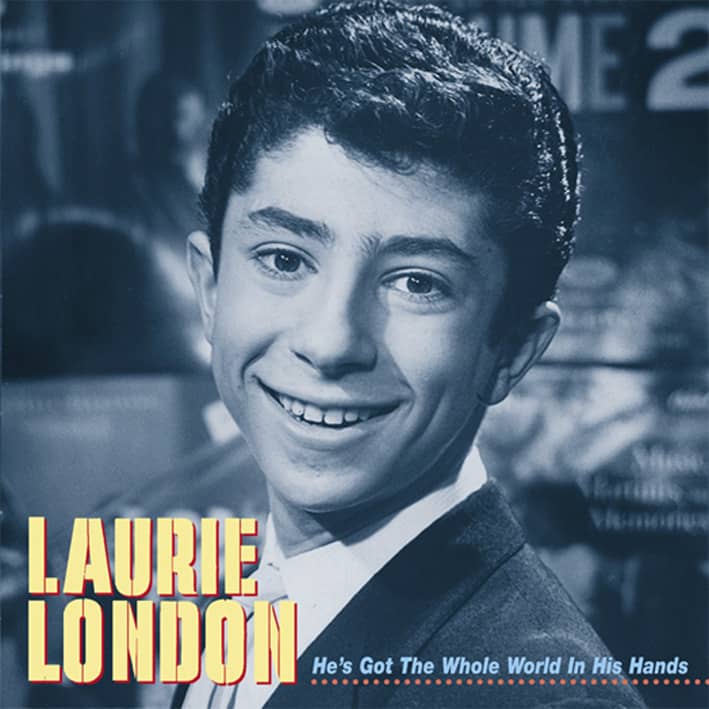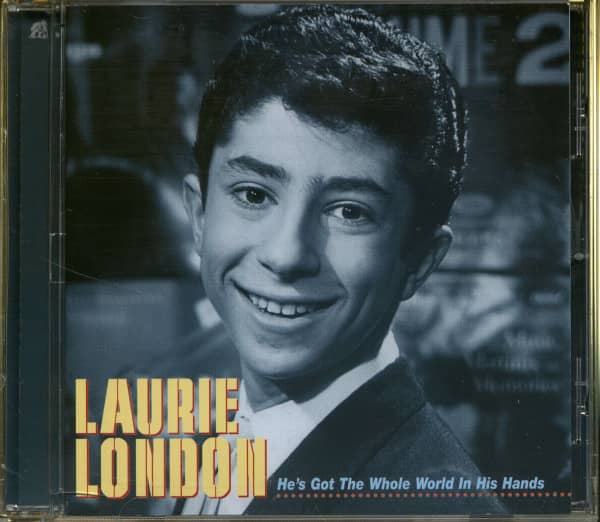Who was/is LAURIE LONDON ? - CDs, Vinyl LPs, DVD and more
LAURIE LONDON
He's Got The Whole World In His Hands
Until The Beatles came along in 1964, British artists were a rarity anywhere in the American 'Pop' singles charts, let alone at the top spot. Vera Lynn had first achieved the feat in 1952 when Auf Wiederseh'n, Sweetheart held Number One for two weeks. Ten years later, in 1962, Mr. Acker Bilk's Stranger On The Shore made the same journey, as did The Tornados'Telstar at the end of that year. Then in 1964, The Beatles swept all before them. But something special did happen in the decade between the 'Forces Sweetheart' and the Somerset clarinettist. That year was 1958.
In 1956, the surprise hit of the year, on both sides of the Atlantic, was Lonnie Donegan's Rock Island Line, by any definition a novelty song of American folk origin, nevertheless leading to the 'Great British Skiffle' explosion. It never actually made Number One, peaking at eight on the U.S. 'Billboard' chart, and taking several years to win a gold record for selling more than one million copies. Following in Donegan's footsteps over a year later, skiffler Chas McDevitt charted in the States at a lowly 40 with his, or rather Nancy Whiskey's, Freight Train. This was easily eclipsed by the magnificent fourth place reached by ex-Butlin's holiday camp 'Red Coat' Russ Hamilton with Rainbow in June, 1957. Curiously, the song had nothing like that impact at home, where it had been the flip-side to Hamilton's big hit, the simple but charming (and self-penned) We Will Make Love, which had reached number two on the U.K. chart.
Russ Hamilton's follow-up and only other hit, Wedding Ring, was just exiting the lower reaches of the British Top Thirty when a Negro spiritual recorded by a 13-year-old English schoolboy from a Jewish background made its appearance. The boy was Laurie London (appropriately from North London), the song He's Got The Whole World In His Hands, recorded (again appropriately) on Sunday, 29th September, 1957. Entering the chart dated 8th November, it remained there for almost three months, reaching a peak position of number twelve. That may well have been that, but upon release in America early in 1958, by the end of March it had entered the 'Billboard' Top 100, hitting Number One three weeks later and, soon after that, total world sales had exceeded the magic million mark, thus making it eligible for a Gold Disc. Not bad for a 13-turned-14-year-old - and English to boot! And not only that - like Lonnie Donegan before him, Master London had achieved transatlantic success by exporting back to America one of its home-grown songs!
To coincide with the release of He's Got The Whole World In His Hands on its Parlophone label, EMI issued the following press release towards the end of October 1957:
Out of the crowds watching closed-circuit television on the B.B.C. stand at this years' Radio Show, a diminutive schoolboy elbowed his way on to the stage and calmly asked guitarist Malcolm Mitchell if he could sing a number on television. A very surprised Malcolm Mitchell found himself not only saying yes, but taking off his valuable guitar and handing it to this thirteen-year-old for him to play his own accompaniment.
His impact with the audience was immediate and the schoolboy, Laurie London, found himself causing a minor sensation, not only amongst the general public, but the many people involved in show business who were at Earls Court. Such was his success the B.B.C. gave him an open invitation to appear on their stand any evening he liked during the span of the Radio Show.
 The invitation was enough for Laurie London, and nothing was going to stop him from making the best possible use of it. No sooner was each school day over and his text books packed away, and Laurie London was speeding across London to do his spot on television. Not just for one night, but for every evening during the remainder of the show.
The invitation was enough for Laurie London, and nothing was going to stop him from making the best possible use of it. No sooner was each school day over and his text books packed away, and Laurie London was speeding across London to do his spot on television. Not just for one night, but for every evening during the remainder of the show.
His initial success was repeated on each subsequent appearance, and he proved himself to be a natural entertainer and a born showman. Needless to say, record company executives were caught up in the initial excitement about this teenage Laurie London, but the first off the mark was E.M.I.'s Norman Newell.
Within days of making his debut, Laurie was in E.M.I.'s Abbey Road Studios making a recording test which led to an immediate recording contract.
His first two titles on the Parlophone label have caused an immediate impact, and has resulted in him making several national T.V. appearances where he has repeatedly increased his reputation. These first titles, 'He's Got The Whole World In His Hands' and 'The Cradle Rock' on Parlophone R. 4359 prove to the utmost the capabilities of young Laurie London and show, without doubt, that he has a dynamic style perfectly suited for the current recording successes. Undoubtedly we shall hear much more of Laurie London in the future.
Laurie London has surprised his parents for he has never had a singing lesson or music lesson, and he certainly has not inherited his talents from anyone in the London family. Meanwhile, of course he is now seriously studying the art of show business between getting down to serious studies at the Davenant Foundation School, Whitechapel Road, in East London.
When EMI issued a new press release sheet almost two-and-a-half years later, in March 1960, it repeated much of the first one, prefacing it with the sentence:
The story of the discovery of Laurie London is as impressive as any of the 'lucky break' tales of show-business.
It added comments about his first single becoming a million-seller and winning a Golden Disc, then continued with the obvious pun:
The boy soon had the whole world at his feet. He made an extensive tour of America, and also visited Malta, France, Germany, Denmark, Norway and Sweden, where he acquired a large fan following. In Germany, he had his record in German of 'Boom-Ladda-Boom-Boom' [or rather the more prurient Teutonic spelling as 'Bum-Ladda-Bum-Bum'] high in the Hitparade, and was also in line for a film contract. In England he was set to play opposite Hughie Green in a musical comedy, scheduled for shooting in April 1960.
The press release ended with a list of all his singles, plus two EPs and his inclusion on the Parlophone 'Six-Five Special' album, all obviously still available. So who was this boy who had topped the American charts and sold over a million copies of his first single in the process? Aided by contemporary reports and the grown-up contribution of Laurie London himself, a fuller story can be told.
Lawrence London was born on 19th January, 1944, in war-torn London, England. When fame struck thirteen years later, there was no need of a stage name like Tommy Steele or Marty Wilde as Laurie London sounded perfect. His family were Anglicised Jews and the surname would have been adopted a few generations past when his forebears settled in what was then the largest, and wealthiest, city in the world.
From his earliest age, Laurie remembers that he loved to sing and it became normal for him to be trotted out in front of visitors to perform. Under the headline "I have doubled my pocket money!" and featuring a publicity shot of him wearing a hotel pageboy costume (the sort of gimmick he loathed), Laurie was interviewed by Maurice Burman in February 1958 for the Melody Maker weekly paper. In print, Burman comes across as unbelievably patronising, at least by modern standards, but he did delve into Laurie’s youthful past:
"I opened the door and a likeable little shrimp walked in. My dog took one look and set up a fearful din. The shrimp jumped in surprise and sat down. I pushed a box of sweets and a bowl of fruit towards him. He sat silent, solemnly chewing a banana."
After an initial conversation about lyric-writing, Burman continues:
"He munched a candy sweet sagely. Fourteen years old London born, Laurie, 4ft. 10 in. [1.47 metres] high, black hair, brown eyes, is a sensitive, alert and slightly jumpy child. He is good-looking, likeable and polite. 'Laurie, how did you get into this?'
'My father gave me a banjo when I was nine. I didn't like it. I used to hold the top part in front of a mirror, but not the bottom half, so that I could imagine it was a guitar. I was eleven when I got a guitar and I taught myself a few chords. I've always sung ever since I could remember.'
'Little mate,' I said, 'what singers do you like?'
'Frankie Vaughan and Shirley Bassey.'
'How about Sinatra?'
'Well, I'm not all that crazy about him.'"
Burman proceeds to play a Frank Sinatra record, followed by Ella Fitzgerald, then asks if Laurie knows of Joe Williams. "I'm afraid I haven't heard of him," comes the not surprising reply. Perhaps if the ageing, clearly biased Burman had asked about Elvis Presley, Guy Mitchell, Tommy Steele or Lonnie Donegan, or even Max Bygraves, then Laurie might have had something to say; he did state, "I've never heard Ella. I haven't got a record player. We are on DC." This last refers to electricity at a time when, even in London, some homes were still supplied direct current (DC) as opposed to the normal alternating one (AC). (In fact, even in 1957, it was easy to find older homes which still had no electricity at all, only gas.)
It is interesting that despite a keen interest in music, Laurie had not the additional source of listening to records at home. He recalls the Sunday afternoon radio show 'Forces Favourites', which was primarily a request show for servicemen stationed in Germany and their families back home. There was also the dubious pleasure of tuning in to the fluctuating signal of Radio Luxembourg. Additionally, there was music on television, the London family being ahead of many in acquiring a set in post-war, austerity Britain. Laurie remembers Jim Dale performing Be My Girl, with obligatory guitar slung around his neck, on the new show (in 1957) 'Six-Five Special'. Through television and films, he was a fan of all-things cowboy, and his unusual acquisition of a guitar in the pre-skiffle period was because of his admiration in particular of 'Singing Cowboys' like Gene Autry and Roy Rogers. Laurie also remembers being impressed by the films 'The Jolson Story' and its sequel 'Jolson Sings Again', both starring Larry Parks in the role of Al Jolson.
Laurie London He's Got The Whole World In His Hands
Read more at: https://www.bear-family.com/london-laurie-he-s-got-the-whole-world-in-his-hands.html
Copyright © Bear Family Records
Copyright © Bear Family Records®. Copying, also of extracts, or any other form of reproduction, including the adaptation into electronic data bases and copying onto any data mediums, in English or in any other language is permissible only and exclusively with the written consent of Bear Family Records® GmbH.

Ready to ship today, delivery time** appr. 1-3 workdays

Ready to ship today, delivery time** appr. 1-3 workdays

only 1x still available
Ready to ship today, delivery time** appr. 1-3 workdays

Ready to ship today, delivery time** appr. 1-3 workdays

